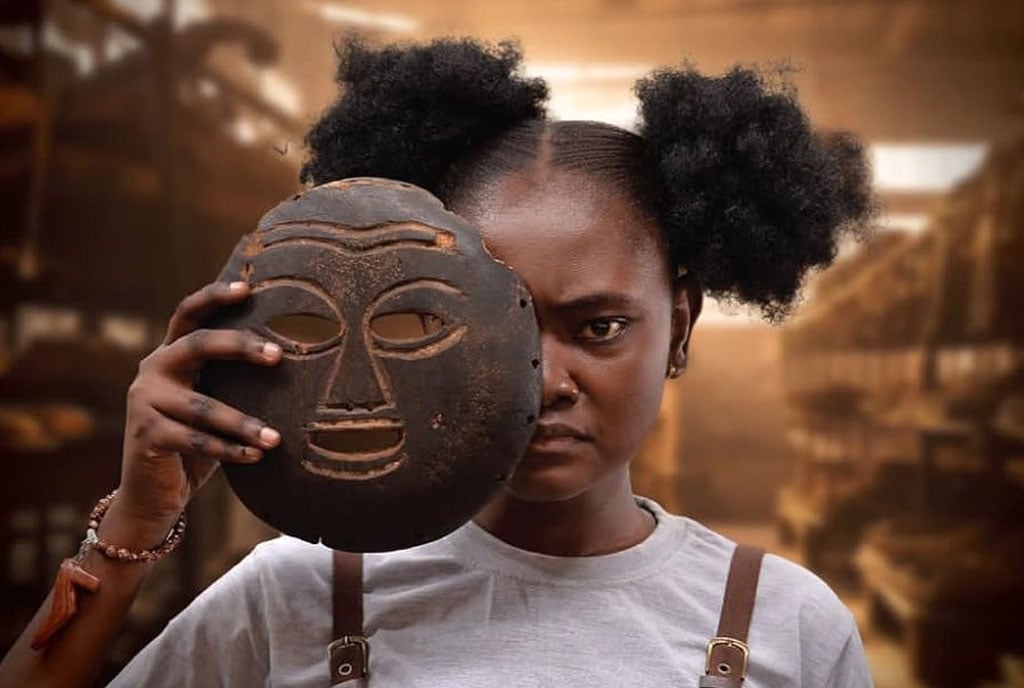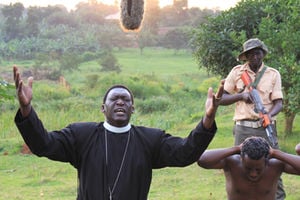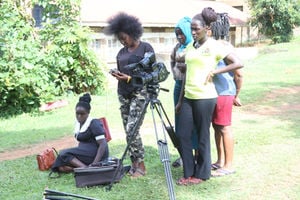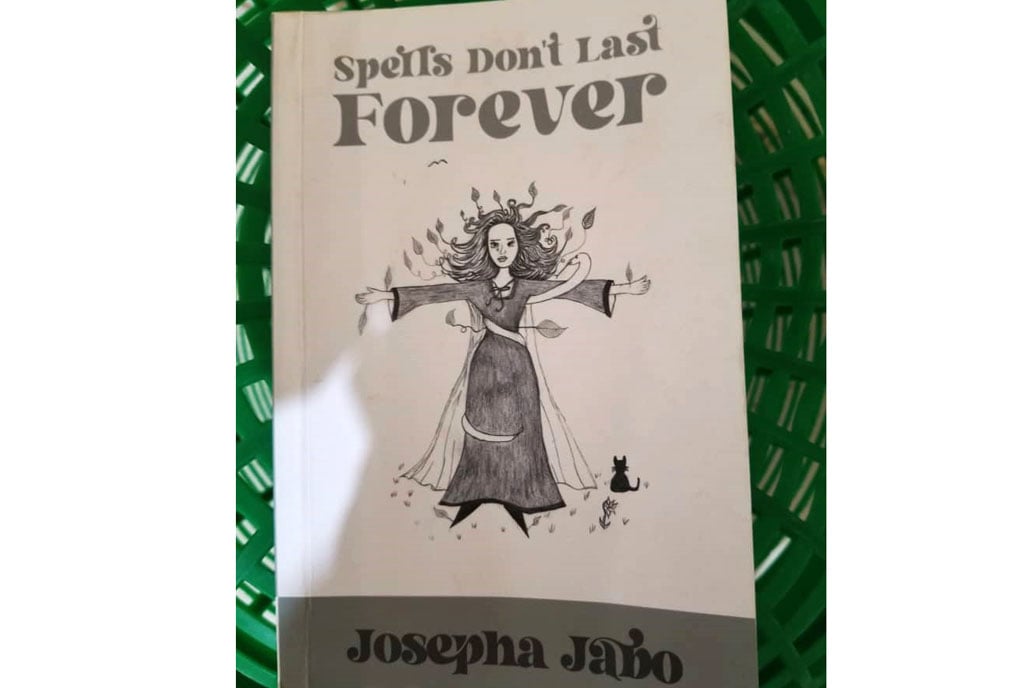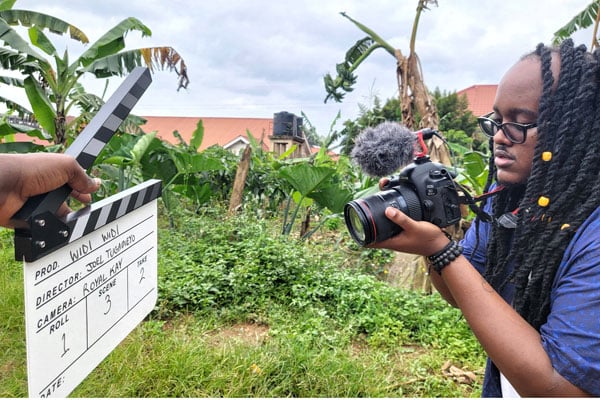
Filmmaker Joel Tugaineyo shoots a video. He says there are international collaborators interested in working with local filmmakers like him. PHOTO/EDGAR R. BATTE
A bunch of Ugandans find themselves teeming with a new-found energy after coming through a three-day training workshop with two acclaimed Hollywood filmmakers.
The filmmakers, Effie Brown and Dana Sims, conducted the engagement dubbed ‘Experience of the Business of Film Workshop.’
Brown is a film producer, chief executive officer and majority owner of Gamechanger Films, which is behind titles such as: Real Women Have Curves, Dear White People, and Rocket Science.
On her part, Sims is an executive producer who has worked with music clients and crossed them over into film and television. These include Ludacris, Jill Scott, Common, Erykah Badu, Kanye West, 50 Cent, Snoop Dogg and Kirk Franklin.
Cissy Nalumansi, a film scriptwriter, producer and director told Saturday Monitor that her experience during the workshop was great.
She adds that the training focused more on how to pitch your show and the must haves for every pitch deck.
“This was followed up with actual pitching sessions to potential funders. Pitching for the first time was a rollercoaster of emotions for me, but I was mostly anxious,” she elaborated, adding, “It was not a drill, actual funders who would pick interest in my project were present to listen to me tell them about my project. My nerves were up. My project was on the line. I did great and now I know how to package and present my project.”
The workshop was an eye-opener for self-taught Ugandan-Dutch filmmaker, Yuri Yabi Blaak, who admitted that getting the kind of insight into the business of film was invaluable.
One of his biggest takeaways was learning how to pitch effectively. He had never pitched his documentary in such a structured way before, so being able to practice in front of seasoned industry veterans was huge.
“It gave me a whole new perspective on how to understand an audience’s needs and to position not only the story but also myself as a filmmaker. A key point that stood out was the importance of selling your unique perspective. Investors and partners are not just interested in the project itself- they’re investing in you as the creative driving force behind it. I feel much more prepared to pitch future projects, and it’s amazing to see how these insights have helped me and my peers level up our approaches in such a short time,” he explained.
The best part for him, though, was building connections with fellow Ugandan creatives.
Blaak adds: “Going through this intensive experience together has created a new network of peers, people who are at various stages in their careers but who now share a mutual commitment to helping each other succeed.”
The experience allowed the creatives the opportunity to share insights and engage with each other and their facilitators.
Patricia Mugisha singles out the session on effective pitching for funding as specially insightful, as it provided a practical framework for turning creative ideas into proposals that resonate with potential funders.
The other valuable aspect of the workshops for her, was learning how to communicate the essence of a project in a way that is compelling, clear, and aligned with the priorities of funders.
Mugisha, a communication professional too, elucidates: “The speakers emphasised the importance of storytelling; not just within the content we create, but also within the pitch itself. This means crafting a narrative that highlights the project's impact, feasibility, and cultural relevance, as well as our own commitment to bringing it to life.”
The speakers also discussed key elements funders look for: a clear vision, well-defined goals, and a strong sense of who the target audience is.
“The focus on refining a project’s ‘why’—explaining why it matters and why it’s unique—was a crucial takeaway for me. Additionally, the workshop provided practical advice on anticipating questions and addressing any concerns funders may have, from budget breakdowns to the long-term sustainability of the project,” she adds.

Film producer, director and script writer Cissy Nalumansi on a movie set of one her movies.
Joel Tugaineyo is the director of Ten Twenty Two Production that stretches its synergistic partnerships into Germany, Kenya and Tanzania.
He says his take-away from the film workshop is that there are international collaborators interested in working with local filmmakers like him.
“It is very encouraging to hear feedback from these accomplished ladies and to know that they have interest in our local audiences. They have talked to us about distributing internationally but also got to listen to speakers like Samuel Tebandeke on how to lay strategies to distribute locally,” he says.
With the nuggets, Tugaineyo is confident that there is money that can be made locally.
He explains: “We can have our own Hollywood stars here without going any far. I’ve gained all the faith that the project I'm doing is going to gain fruit. Originally our distribution strategies just involved putting your film in a film festival where we wouldn’t earn much money, even if we got an award.”
New strategies were suggested—a filmmaker can show their movie in schools and institutions, organise movie nights or take road shows where people pay to watch it and can also take it to bibandas (temporary movie venues) where they can work hand-in-hand with local distributors and video jockeys who can translate the films in different local languages.
Tugaineyo adds: “We shouldn't behave as if we are Hollywood's, and have only red carpet premieres. We need to get to the ordinary Ugandans to watch our film in a sustainable mood while paying us.”
To Lloyd Lutara, it was good that the celebrated Hollywood producers came to Uganda where the filmmakers are.
“Whenever there are opportunities, they come with strings attached and they want to take what you do and fulfil their agenda, so what I’ve liked with this workshop is that they found us where we are and they have seen the potential and talent here,” he says.
Peter Mukiibi, the founder of Addmaya, was happy that the elephant in the room—funding—was tackled.
“Without money you cannot make films, meaning you have to partner with people who have money to be able to make money. Workshops like these teach us how to package our concepts because then it opens a world of potential investors if we know how to go about it,” he says.
Mukiibi further notes that Ugandan filmmakers need such workshops to spur them into stepping up to the plate to make films like Shaka Zulu, which enjoy global appreciation.
“We have got our own history and these stories need to be told but unfortunately we lack funding. Most of the people who have money in Uganda choose to put their money in real estate, and film is a good avenue for investment if they could have their eyes open. For example, if I invest my money in a film and it is able to show in Nigeria, I'm tapping into a market of 200 million people,” he adds.
Mugisha reveals that being part of the three-day workshop inspired her to approach her projects with an even sharper focus on purpose and structure.
This, she reckons, will ensure that each project proposal is not only creative but also grounded in practical details that show funders its viability and impact potential.
With the new knowledge acquired, she plans to refine her pitches to ensure they tell a story that resonates and demonstrates the value her projects bring, both culturally and creatively.

